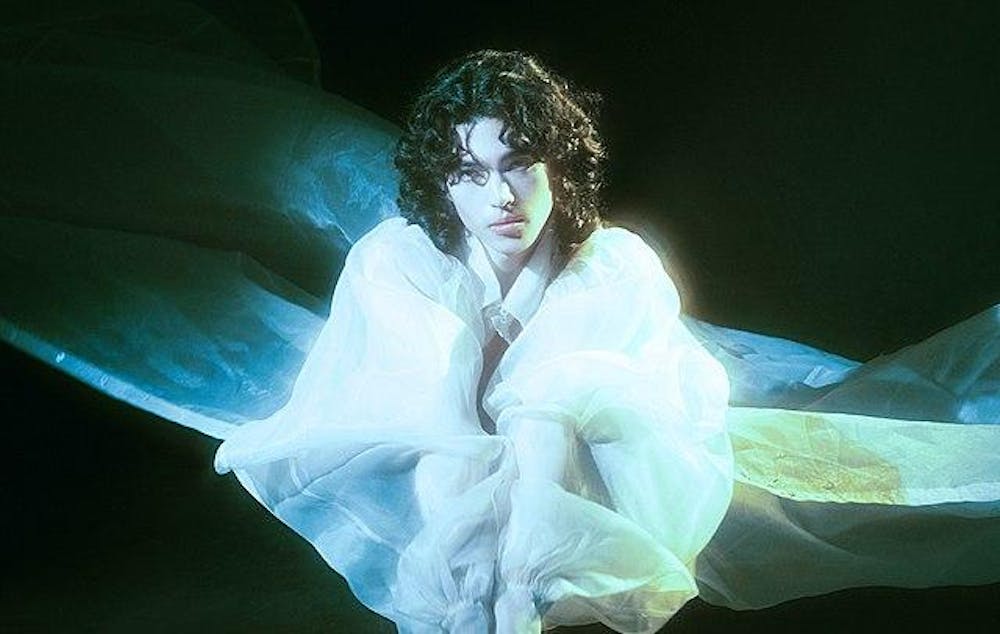With 12 tracks full of emotion and wistful lyricism, the musical storyline of Conan Gray’s fourth album, “Wishbone,” paints the hopefulness of falling in love, and the painful, bittersweet memories that come with falling out of it. Potentially his best work to date, the narrative explores the kaleidoscope of emotions accompanying romance and dives into Gray’s understanding of himself, pairing his usual relatability with an elevated scope of maturity and refined songwriting.
With “Wishbone,” Gray adopts his beloved original sound — vulnerable, confessional and often melancholic, even with upbeat guitar backings. For many fans, this proves a welcomed return following his more experimental 2024 album, “Found Heaven,” which was met with less success than its predecessors, “Superache” in 2022 and “Kid Krow” in 2020.
The arc of the album proves non-linear, a mirror of the tumultuous stages of a relationship and self-reflection from Gray. The album moves through the blunt hurt and reeling memories of its first track “Actor”, to the realization of promises broken in “Caramel”, and finally narrates the slow process of moving on while struggling with ties to the past in the closing track, “Care.”
As the lead single released May 30, “This Song” presents a conversation-like glimpse into this emotional saga. Throughout the record, Gray opts for a second-person narration that speaks directly to the “you,” the partner in his relationship, and creates a confrontational intimacy. While released months in advance of the album, this second track features romantic orchestral backing and reveals the hopeful beginnings of their romance as Gray affectionately describes, “I hear your heart like a train on the tracks / Your eyes are like heaven, your voice is like rain / 11:11s, they all hear your name.”
But this seemingly whirlwind love quickly crashes down to reveal a hidden toxicity in track four titled “Romeo.” Despite the song’s nod to the Shakespearean love story, it proves an anthem for higher standards and self-respect, as Gray exposes his anger singing, “The selfish way that you treated me … I drank your poison from your lips, I took that blade into my ribs.”
Rather than being trapped by heartbreak, Gray calls out the toxic behaviors he endured and turns his vulnerability into a declaration of personal growth and resilience promising, “I’m never gonna want you back, you put me in a grave of stone, but now it only makes me laugh.”
Within this record of confessions and concessions, Gray also opens up about his childhood and how his past shapes the way he connects. Titled “Class Clown,” track six explores lyricism that unpacks his younger years and the shadows of family tensions. With delicate guitar plucking creating an almost creeping melody, Gray sheds light on an uneasy relationship with his father and his use of humor as a shield. “While my father was barreling fists / I was laughing all the way through it,” he sings. Through the album, Gray reveals how these defense mechanisms and struggles to trust make appearances not only in his family relationships, but also in his trysts.
These vulnerable admissions reveal a commitment to this album’s full exploration of Gray’s inner feelings and his own journey with love and loss. A slow and emotional build, “Nauseous” poetically culminates the haunting childhood trauma and fear of letting others in with the personal growth and cathartic learnings of Gray through his relationships. He admits, “I know that it’s in me to really love someone, but that’s not a thing that I learned from my loved ones.”
While Gray tends to keep explicit mentions of his private life out of the media, the release of “Wishbone” triggered a flurry of fan theories of possible beaus. Even if the recipient remains anonymous to the public eye, the overwhelming and raw emotions present in this musical story reflect a deep experience of love.
An album full of hope and hurt, rage and regret, “Wishbone” somehow showcases devastating lyrical genius and genuine heartbreak, while maintaining a mix of lilting melodies and head-bopping, up-tempo hits. The relationship reflection encompasses Gray’s takeaways, for better or worse, and how his outlook on love and life has been shaped. Returning to his roots, Conan Gray confidently reflects on and redefines love and his past in possibly his most resonant and impressive release to date.







